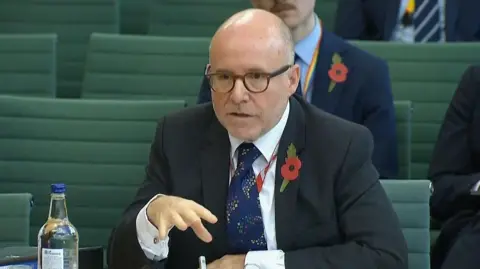Attorney general blames outdated law for collapse of China spy case
25 minutes agoBecky MortonPolitical reporter

 PA Media
PA MediaThe attorney general has blamed “out of date” legislation for the collapse of a case against two men accused of spying for China.
Lord Hermer – who is the government’s chief legal adviser – said if a new law had been in place at the time of the alleged offences he had “no doubt” the trial would have gone ahead.
Prosecutors dropped charges against Christopher Cash and Christopher Berry, who both deny any wrongdoing, in September.
Mr Cash, a former parliamentary researcher, and Mr Berry, an academic, were charged under the Official Secrets Act, legislation which dates back to 1911.
The pair were accused of gathering and providing information prejudicial to the safety and interests of the state between December 2021 and February 2023.
Giving evidence to Parliament’s Joint Committee on the National Security Strategy, Lord Hermer said the Official Secrets Act “wasn’t fit for purpose” and posed a “very significant problem” for the case.
Under the legislation, anyone accused of spying can only be prosecuted if the information they passed on was useful to an enemy.
Lord Hermer said the collapsed of the case exemplified the “difficulties” the term “enemy” posed.
However, he said new legislation which was passed in 2023, the National Security Act, removed this problem as it only required proof the information was being passed to a foreign power.
“Speaking frankly, I don’t understand why it took Parliament so long to pass that [legislation],” he told the committee.
“Had that act been in force at the relevant time to this case… I have no doubt that the prosecution would have proceeded to trial.”
Lord Hermer said there were lessons that could be learned from the collapse of the case but it was “unwise” to brand it “farcical” or “a catastrophic failure”.
He added that all sides had been “working incredibly hard to try and get this prosecution over the line”.
Director of public prosecutions Stephen Parkinson has said the case could not progress because the government’s witness, deputy national security adviser Matt Collins, would not explicitly say China was an active threat to national security at the time of the alleged offences.
Prosecutors believed his witness statements would not meet the requirement to prove China was an “enemy” under the Official Secrets Act, after a Court of Appeal ruling in another spying case in July 2024 clarified the law.
Mr Collins told the committee on Monday he had been given legal advice that his evidence would be sufficient and was surprised when he learnt the case was being dropped.
He insisted he outlined a range of threats China posed to the UK’s national security in his witness statements, in line with the government’s policy at the time of the alleged offences.
The collapse of the case triggered a political row over who was to blame. The Conservatives have accused the Labour government of allowing the case to fail because it wanted to foster closer economic ties with Beijing.
However, the government has maintained that no ministers or special advisers were involved in the decisions which led to the collapse of the case or the evidence provided, and that Mr Collins’ evidence was based on the Conservative government’s policy at the time.
Ministers have insisted they are frustrated the case did not proceed.
Lord Hermer told the committee allegations politicians had interfered in the case were “baseless” and “disgraceful”.
He argued it would have been inappropriate for him to interfere with the prosecution’s decision and contrary to “basic constitutional principle”.
Senior minister Darren Jones, who gave evidence alongside Lord Hermer, also denied accusations of political interference in the case.
“I think at the administrative level, the independence of the CPS [Crown Prosecution Service], the role of ministers, the role of the attorney, that’s all worked as it should do,” he said.
“The root cause of the problem here is that the case in question was charged under very old legislation.”
Jones was also challenged by the committee over the government’s approach to China and the perception that it was “kowtowing” to Beijing.
He reject this, insisting the government does not “shy away from the series of threats that China poses to the UK”.
Jones sought to contrast Labour’s position with that of the previous Conservative government, which he claimed “was not to talk to China at all”.
He added: “It’s right that we have a working relationship with the Chinese government and their officials, and it’s right that we are robust in dealing with these issues.”


Sign up for our Politics Essential newsletter to keep up with the inner workings of Westminster and beyond.